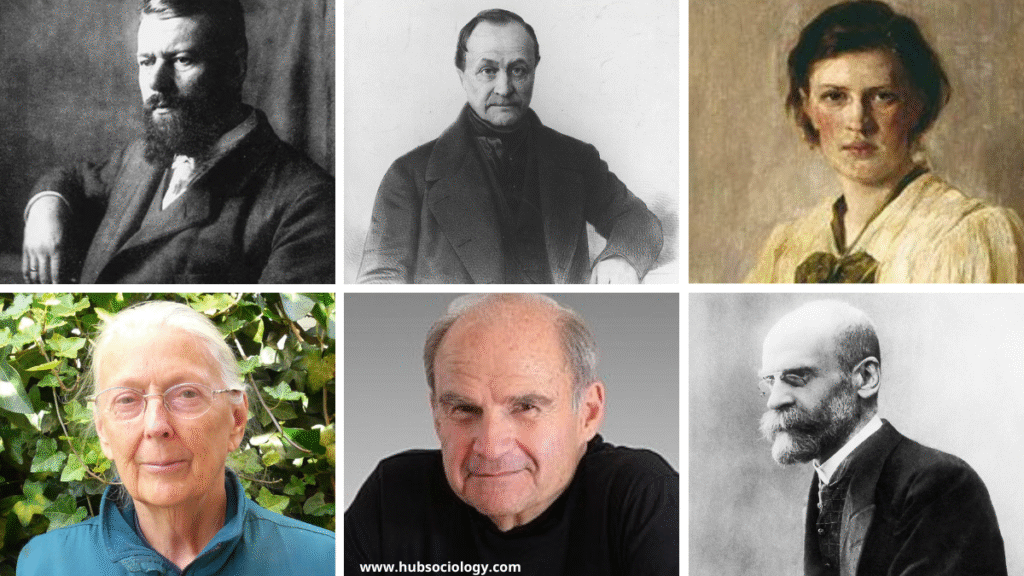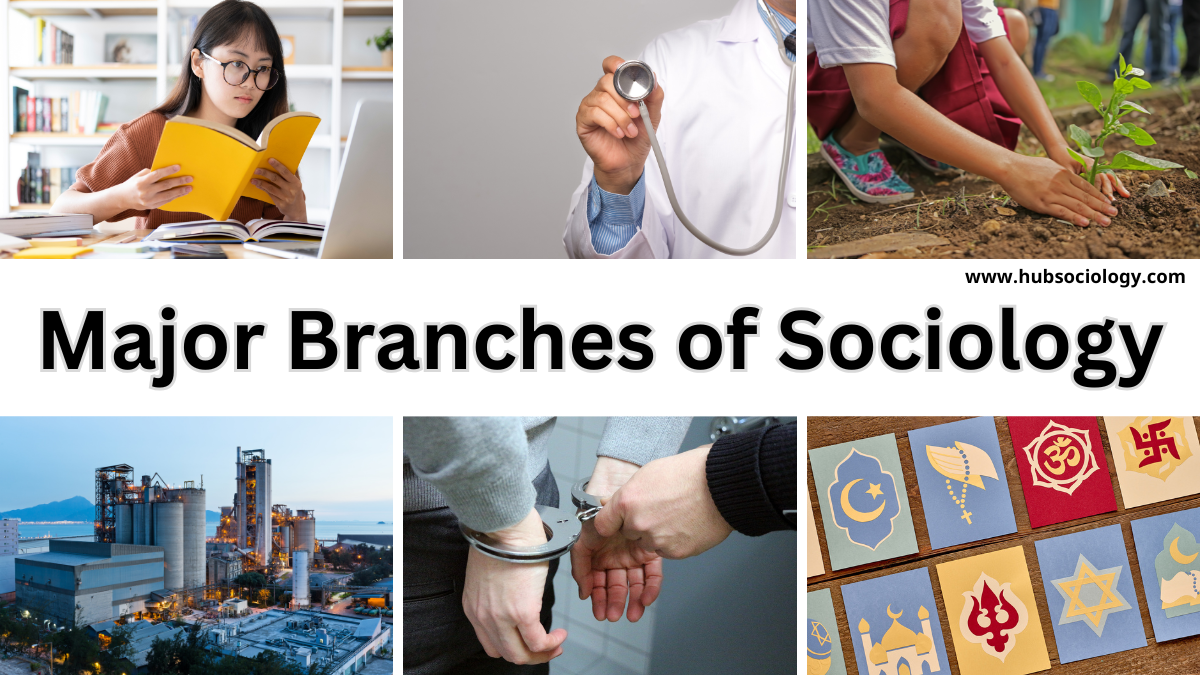Introduction on Branches of Sociology
The scientific study of society, interpersonal connections, and human behavior in social settings is known as sociology. As a broad discipline, it encompasses various branches that examine different aspects of social life, institutions, and interactions. These branches of sociology allow sociologists to specialize in specific areas, providing deeper insights into how societies function, evolve, and influence individuals.
This article explores the major branches of sociology, highlighting their significance, key concepts, and contributions to understanding human society.

1. Theoretical Sociology
Definition and Scope
Theoretical sociology important among branches of sociology, it focuses on developing frameworks, models, and theories to explain social phenomena. It aims to comprehend the fundamental ideas that underpin social structures, behavior, and transformations.
Key Perspectives
- Functionalism (Structural Functionalism)
- Emphasizes the interdependence of social institutions (family, education, religion) in maintaining societal stability.
- Key thinkers: Émile Durkheim, Talcott Parsons.
- Conflict Theory
- Investigates social disputes, power struggles, and injustice brought on by differences in gender, race, and class.
- Key thinkers: Karl Marx, Max Weber.
- Symbolic Interactionism
- focuses on small-scale interactions and how people utilize communication and symbols to construct meaning.
- Key thinkers: George Herbert Mead, Herbert Blumer.
Significance
Theoretical sociology provides the foundation for empirical research, helping sociologists interpret social patterns and predict future trends.
2. Historical Sociology
Definition and Scope
Historical sociology one of famous among branches of sociology, it studies how historical events have shaped modern civilizations by looking at social structures and changes over time.
Key Themes
- The rise of capitalism (Karl Marx, Max Weber).
- The development of nation-states and bureaucracies.
- Colonialism and its long-term social impacts.
Significance
By studying historical contexts, sociologists understand the evolution of institutions, cultures, and power dynamics, offering insights into modern social issues.
3. Comparative Sociology
Definition and Scope
Comparative sociology involves analyzing different societies, cultures, and institutions to identify similarities and differences.
Key Approaches
- Cross-national studies: Comparing political systems, economic models, and social policies.
- Cultural comparisons: Examining traditions, norms, and values across societies.
Significance
This branch helps in understanding globalization, cultural diffusion, and the impact of different social systems on human behavior.
4. Criminology
Definition and Scope
The social study of crime, criminal conduct, and the criminal justice system is known as criminology.

Key Theories
- Social Disorganization Theory
- Connects a lack of social control and neighborhood circumstances to crime.
- Strain Theory (Robert Merton)
- Suggests crime results from societal pressures and lack of legitimate opportunities.
- Labeling Theory
- Examines how societal labels (e.g., “criminal”) influence behavior.
Significance
Criminology informs policies on crime prevention, rehabilitation, and justice reform.
5. Political Sociology
Definition and Scope
Political sociology studies the relationship between society and political systems, including power, governance, and social movements.
Key Themes
- Power and authority (Max Weber’s types of authority: traditional, charismatic, legal-rational).
- Social movements (e.g., civil rights, feminism).
- State-society relations (how governments influence social structures).
Significance
It helps explain political participation, revolutions, and policy-making processes.
6. Economic Sociology
Definition and Scope
The study of economic sociology looks at how social factors affect markets, institutions, and economic behavior.
Key Concepts
- Social embeddedness (Mark Granovetter): Economic actions are shaped by social relationships.
- Capitalism and class structures (Karl Marx).
- Consumer culture and globalization.
Significance
It provides insights into inequality, labor markets, and the social dimensions of economic systems.
7. Urban Sociology
Definition and Scope
Urban sociology studies social life, structures, and problems in urban areas.
Key Themes
- Urbanization and its effects (gentrification, segregation).
- Social networks in cities.
- Crime and poverty in urban settings.
Significance
It aids in urban planning, policy-making, and addressing challenges like homelessness and infrastructure development.
8. Rural Sociology
Definition and Scope
Rural sociology focuses on social structures and issues in rural communities.
Key Themes
- Agricultural changes and rural economies.
- Migration patterns (rural-to-urban shifts).
- Community bonding and traditions.
Significance
It helps in developing policies for rural development, agriculture, and sustainability.
9. Medical Sociology
Definition and Scope
The social facets of health, illness, and healthcare systems are studied by medical sociology.

Key Themes
- Social determinants of health (class, race, gender).
- Healthcare disparities and access.
- Mental health and stigma.
Significance
It informs public health policies and improves healthcare delivery.
10. Environmental Sociology
Definition and Scope
Environmental sociology studies the interactions between society and the natural environment.
Key Themes
- Climate change and social responses.
- Sustainable development and environmental justice.
- Industrialization’s ecological impact.
Significance
It promotes awareness of environmental issues and advocates for sustainable practices.
11. Sociology of Education
Definition and Scope
This branch analyzes how education systems influence and are influenced by social structures.
Key Themes
- Education and social mobility.
- Inequality in schooling (funding disparities, racial segregation).
- Role of education in socialization.
Significance
It helps reform educational policies to reduce inequalities.
12. Sociology of Religion
Definition and Scope
This branch explores the role of religion in society and its influence on behavior.
Key Themes
- Secularization and modernization.
- Religious conflicts and fundamentalism.
- Religion and social cohesion.
Significance
It enhances understanding of cultural conflicts and interfaith relations.
13. Sociology of Gender and Sexuality
Definition and Scope
This branch examines gender roles, sexuality, and their social implications.
Key Themes
- Feminist theories (patriarchy, intersectionality).
- LGBTQ+ rights and discrimination.
- Workplace gender disparities.
Significance
It contributes to gender equality movements and policy changes.
14. Sociology of Family
Definition and Scope
This branch studies family structures, relationships, and their evolution.
Key Themes
- Changing family forms (single-parent, blended families).
- Marriage and divorce trends.
- Domestic violence and child-rearing practices.
Significance
It informs social policies on childcare, marriage laws, and welfare systems.
15. Industrial Sociology
Definition and Scope
Industrial sociology examines work, labor relations, and organizational behavior.
Key Themes
- Workplace hierarchies and alienation (Karl Marx).
- Automation and job displacement.
- Corporate culture and employee well-being.
Significance
It aids in improving labor laws and workplace conditions.
16. Sociology of Law
Definition & Scope: Examines the relationship between law and society, including how laws are created, enforced, and resisted.
Key Themes:
- Legal systems and social control.
- Crime, punishment, and justice.
- Human rights and social movements.
Significance: Helps in legal reforms and understanding how laws reflect societal values.
17. Sociology of Deviance
Definition & Scope: Studies behaviors and conditions that violate social norms.
Key Themes:
- Theories of deviance (Labeling Theory, Differential Association).
- Stigma and social reactions to deviance.
- Crime vs. non-criminal deviance (e.g., subcultures).
Significance: Challenges stereotypes and informs policies on rehabilitation.
18. Sociology of Migration
Definition & Scope: Analyzes patterns, causes, and effects of human migration.
Key Themes:
- Refugees and asylum seekers.
- Assimilation vs. multiculturalism.
- Transnational communities.
Significance: Addresses global migration crises and integration policies.
19. Sociology of Aging (Gerontology Sociology)
Definition & Scope: Studies the social aspects of aging and elderly populations.
Key Themes:
- Ageism and discrimination.
- Retirement and pension systems.
- Elderly care and intergenerational relationships.
Significance: Helps design better elderly welfare programs.
20. Sociology of Science and Technology
Definition & Scope: Explores how science and technology shape (and are shaped by) society.
Key Themes:
- Digital divide and social inequality.
- Ethics of AI and biotechnology.
- Social media’s impact on behavior.
Significance: Guides tech policies and ethical innovation.
21. Sociology of Sports
Definition & Scope: Examines sports as a social institution.
Key Themes:
- Gender and racial disparities in sports.
- Commercialization and fandom.
- Sports and national identity.
Significance: Addresses discrimination and promotes inclusivity in athletics.
22. Sociology of Art and Culture
Definition & Scope: Studies how art, music, and media reflect and influence society.
Key Themes:
- Cultural hegemony (dominance of certain art forms).
- Subcultures and countercultures.
- Pop culture and socialization.
Significance: Explores identity formation through cultural expression.
23. Sociology of Food
Definition & Scope: Analyzes food production, consumption, and its social meanings.
Key Themes:
- Food insecurity and poverty.
- Cultural rituals around eating.
- Fast food vs. organic movements.
Significance: Addresses global hunger and sustainable food systems.
24. Sociology of Emotions
Definition & Scope: Investigates how emotions are socially constructed and regulated.
Key Themes:
- Emotional labor (e.g., service jobs requiring forced smiles).
- Grief, love, and anger in social contexts.
- Gender differences in emotional expression.
Significance: Improves mental health and workplace policies.
25. Sociology of Disasters
Definition & Scope: Studies societal responses to natural and man-made disasters.
Key Themes:
- Social vulnerability in crises.
- Community resilience and recovery.
- Government and NGO roles in disaster management.
Significance: Enhances disaster preparedness and response strategies.
26. Sociology of the Body
Definition & Scope: Examines how society shapes perceptions of the human body.
Key Themes:
- Beauty standards and body image.
- Disability and social exclusion.
- Medicalization of the body (e.g., cosmetic surgery).
Significance: Challenges discrimination based on physical appearance.
27. Sociology of Knowledge
Definition & Scope: Studies how knowledge is produced and influenced by social factors.
Key Themes:
- Ideology and propaganda.
- Scientific biases (e.g., racial or gender biases in research).
- Social construction of truth.
Significance: Encourages critical thinking about information sources.
28. Sociology of Work and Organizations
Definition & Scope: Analyzes labor markets, workplaces, and corporate structures.
Key Themes:
- Gig economy and precarious work.
- Workplace discrimination (gender, race, age).
- Corporate culture and employee burnout.
Significance: Advocates for fair labor practices and work-life balance.
29. Sociology of Fashion
Definition & Scope: Explores fashion as a social phenomenon.
Key Themes:
- Class and consumerism in fashion trends.
- Cultural appropriation vs. appreciation.
- Sustainable fashion movements.
Significance: Examines identity and globalization through clothing.
30. Sociology of Music
Definition & Scope: Studies music’s role in society.
Key Themes:
- Music subcultures (punk, hip-hop).
- Censorship and political protest songs.
- Streaming and the digital music economy.
Significance: Reveals how music shapes social movements.
Conclusion on Branches of Sociology
Sociology is a multifaceted discipline with numerous branches, each offering unique perspectives on human society. From theoretical frameworks to applied fields like criminology and medical sociology, these branches help us understand social structures, inequalities, and transformations. By studying these areas, sociologists contribute to policy-making, social justice, and the betterment of communities worldwide.
As society continues to evolve, sociology remains essential in addressing emerging challenges, ensuring a deeper comprehension of the complex world we live in.
Do you like this this Article ? You Can follow as on :-
Facebook – https://www.facebook.com/hubsociology
Whatsapp Channel – https://whatsapp.com/channel/0029Vb6D8vGKWEKpJpu5QP0O
Gmail – hubsociology@gmail.com
Frequently Asked Questions
General Sociology FAQs
- What is sociology?
Sociology is the scientific study of society, social relationships, institutions, and human behavior in group contexts. - Why is sociology important?
It helps us understand social problems (inequality, crime, racism), cultural differences, and how societies evolve. - What are the main theoretical perspectives in sociology?
- Functionalism (society as a stable system)
- Conflict Theory (power struggles and inequality)
- Symbolic Interactionism (micro-level social interactions)
- How is sociology different from psychology?
Psychology focuses on individual behavior, while sociology examines group dynamics and societal structures.
Branches of Sociology FAQs
- What is criminology?
The study of crime, criminal behavior, and society’s response to crime (laws, policing, prisons). - What does medical sociology study?
How social factors (class, race, gender) affect health, illness, and healthcare systems. - What is environmental sociology?
Examines the relationship between society and the environment (climate change, sustainability, pollution). - What is the sociology of education?
Studies how schools reproduce social inequalities and shape cultural values. - What is urban sociology?
Focuses on social life, problems, and structures in cities (gentrification, homelessness). - What is the sociology of religion?
Analyzes how religion influences social behavior, politics, and identity. - What is political sociology?
Studies power, governments, social movements, and how societies organize politically. - What is economic sociology?
Explores how social relationships shape economic systems (markets, labor, capitalism). - What is the sociology of gender?
Examines how society constructs gender roles, sexuality, and inequalities. - What is the sociology of family?
Studies marriage, parenting, divorce, and changing family structures. - What is industrial sociology?
Analyzes work, labor relations, and corporate cultures.
Emerging & Niche Branches FAQs
- What is the sociology of emotions?
Studies how society shapes feelings like love, anger, and grief (e.g., “emotional labor” in jobs). - What is the sociology of food?
Examines food cultures, hunger, and how eating habits reflect social class. - What is the sociology of disasters?
Analyzes how societies prepare for and respond to crises (natural disasters, pandemics). - What is digital sociology?
Studies social media, online communities, and how technology changes human interaction. - What is the sociology of the body?
Explores how society influences body image, beauty standards, and disabilities.
Bonus: Career FAQs
- What jobs can I get with a sociology degree?
Social work, policy analysis, HR, market research, criminology, education, and NGOs. - Is sociology a science?
Yes, it uses scientific methods (surveys, experiments, data analysis) to study society.
